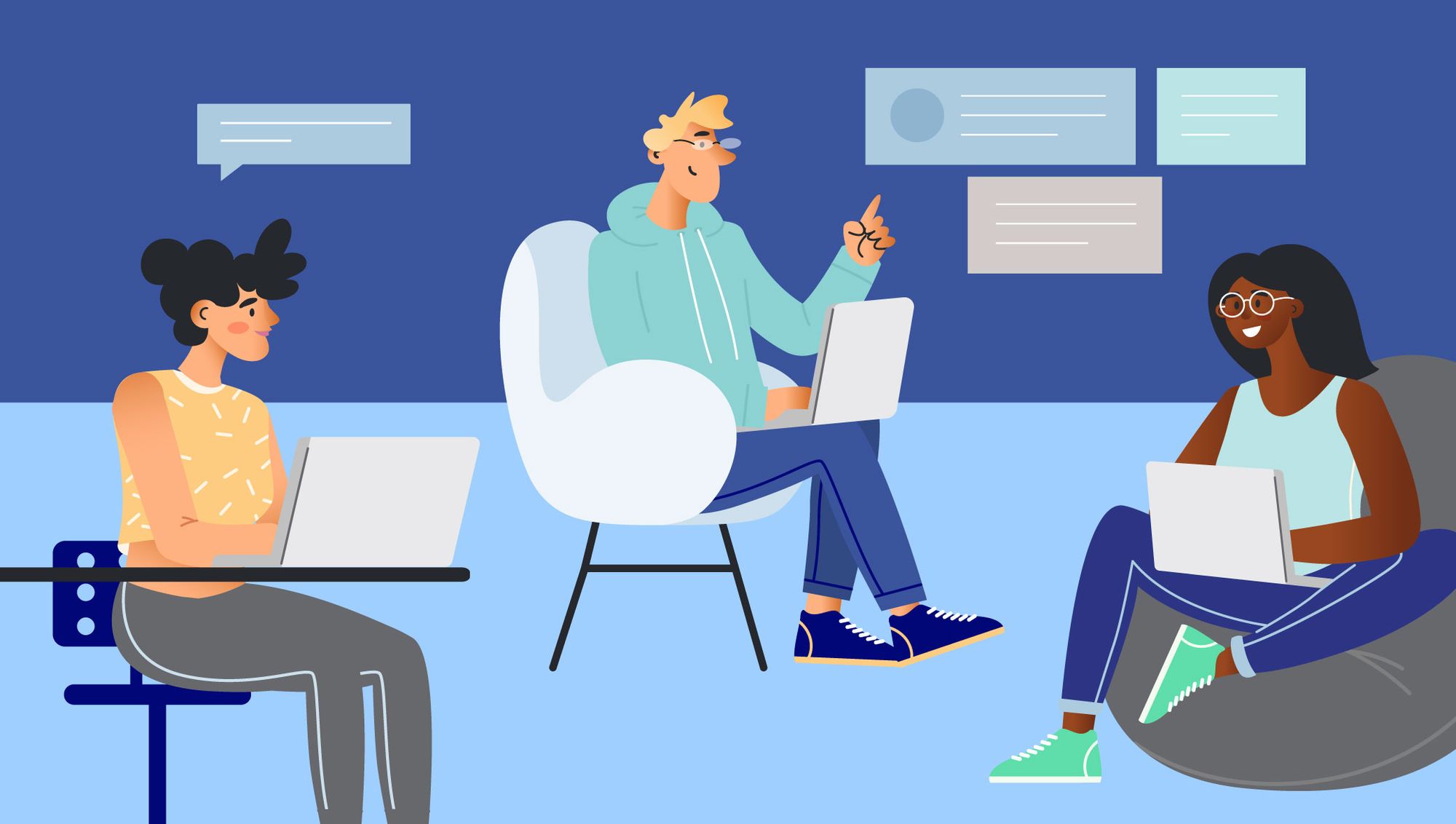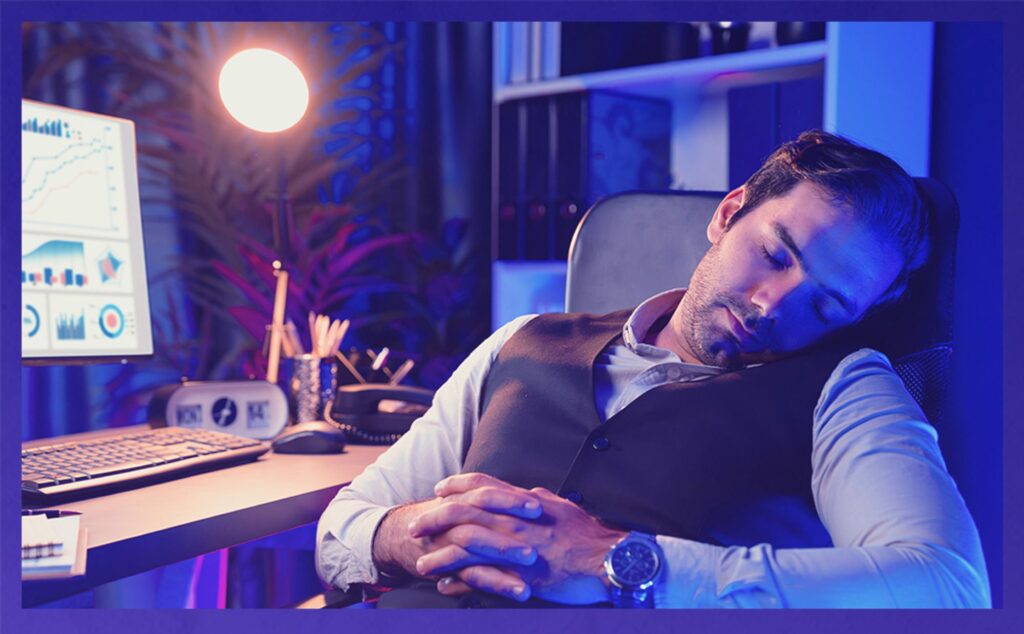
Key Findings
- 61.7 percent of people care more about sleep this year in 2024 than last year.
- 92.6 percent of people want to improve the quality of their sleep this year
- 74.7 percent of people tried a sleep hack in the past 12 months
- 41.4 percent of sleep tracker users started tracking in the past 12 months
- Over half of people plan to purchase a sleep product in 2024
The rise of health influencers on social media, the influx of contradicting information online, and the development of sleep research in the past several years have certainly made an impact on the sleep industry. There are more sleep products and hacks available than we can count, and we’ve even developed a name for the hyperfixation on sleep and sleep quality, termed orthosomnia.
For World Sleep Day this year, we want to highlight this increasing consumer interest in sleep and why it matters for every participant in the sleep industry, even those who don’t think twice about it until their head hits their pillow.
We conducted an exclusive study of over 2,000 American adults to see just how much they care about sleep this year. It turns out that it’s a rising concern for most and over half of people are ready to grab their wallets to get new sleep products this year.
In an exclusive interview, Dr. Raj Dasgupta, quadruple-board certified in pulmonary, sleep, internal, and critical care medicine and Chief Medical Advisor at Sleepopolis, and Dr. Shelby Harris, Licensed Clinical Psychologist and Director of Sleep Health at Sleepopolis, gave their expert insights on the results.
62 Percent of People Care More About Sleep This Year
Unfortunately, sleep often gets put on the backburner when responsibilities like work, parenting, and finances pile up. We are glad to see that more than six in ten Americans care more about sleep this year in 2024 than last year. An even higher percentage (92.6 percent) of people want to improve the quality of their sleep.
That said, just over half (53.7 percent) say they know how to improve the quality of their sleep – meaning a hefty percentage of Americans don’t know how to get a better night’s rest. (Hint; reading this could be a good first step).
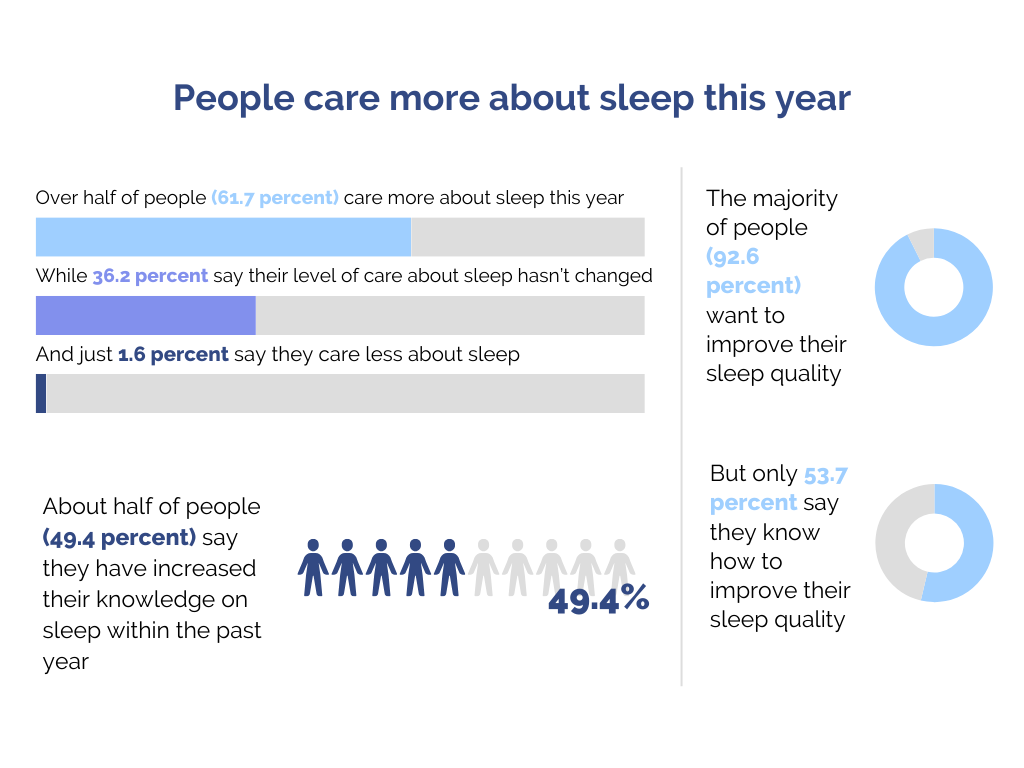
When it comes to this increase in concern about sleep, Dr. Harris says, “In the past year, I’ve seen many people struggle with insomnia due to heightened stress and disruptions in their sleep schedules from changes in their work routines.”
If people care more about sleep this year, what exactly are they doing to prioritize it? With just 4.3 percent of people saying they saw a sleep doctor in the past year and 21.5 percent saying they discussed sleep with their doctor, you might be scratching your head.
On par with many questions, the answer is in Google. The majority of people seem to be taking sleep advice from the internet or social media, which probably isn’t a good idea, according to our sleep experts.
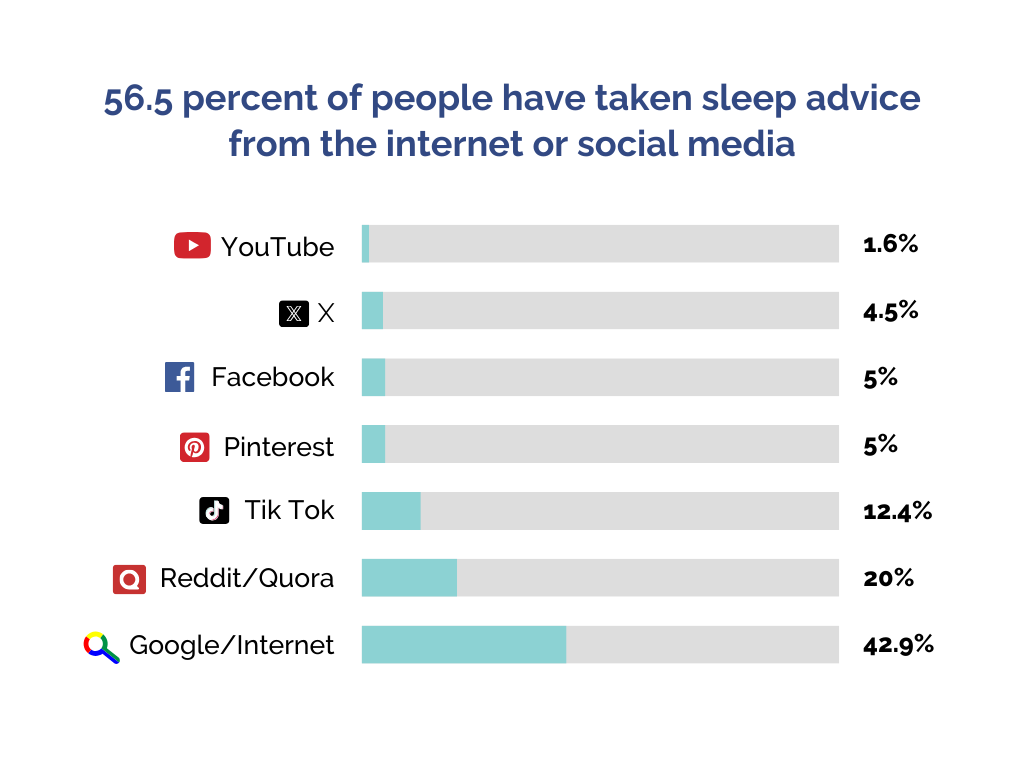
Dr. Raj warns, “Frequently feeling tired throughout the day or needing to take naps during the day can also be a sign that something is wrong with your nighttime sleep, so it’s best to see a doctor for a proper evaluation.”
Dr. Harris adds, “If you feel that you routinely have trouble with the quality or quantity of your sleep multiple nights a week, talk with your doctor or a sleep specialist.”
Read on to learn what else Americans are doing to show they really care more about sleep.
Three-Quarters of People Tried a Sleep Hack
A staggering 74.7 percent of Americans tried some sort of sleep hack in the past year. Here are the most popular sleep hacks that our survey respondents tried:
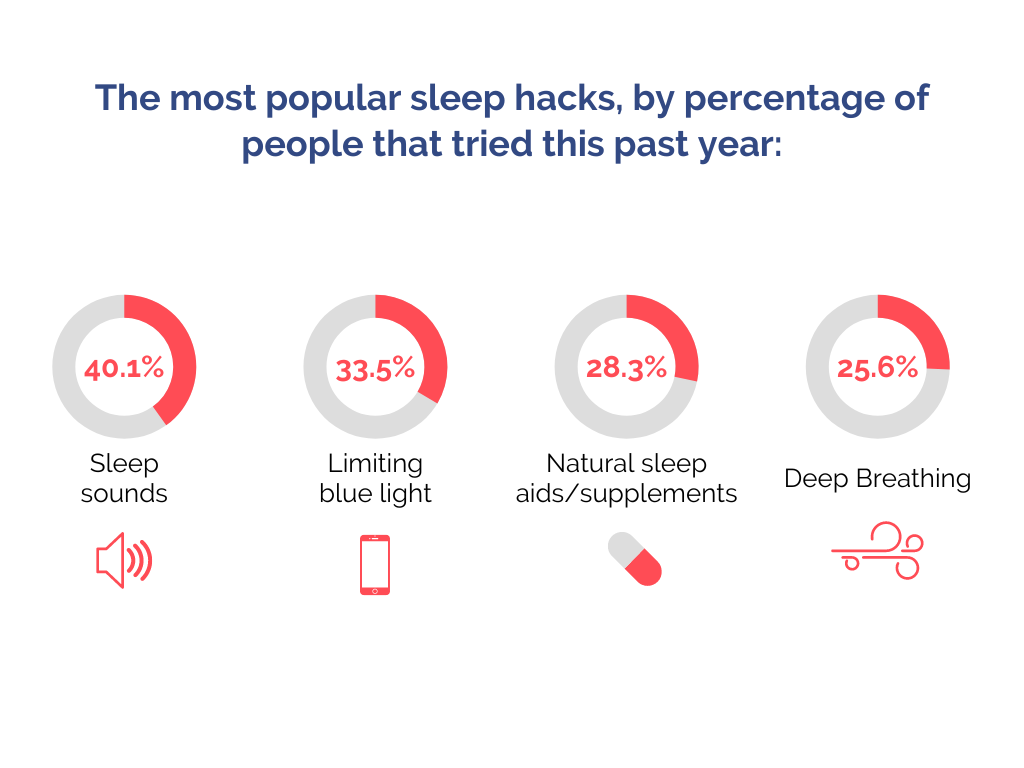
- 40.1 percent listened to sleep sounds in the past year.
- 33.5 percent tried to cut back on blue light in the past year.
- 28.3 percent of people tried a sleep supplement or aid in the past year.
Dr. Harris commented on this trend, suggesting that people talk to medical experts about sleep issues rather than looking to social media for help; “There are many natural cures or hacks for sleep trending on social media, but it’s important to speak with your doctor or a sleep specialist if you are routinely having trouble sleeping.”
Though less common than these sleep tricks, another hack that’s keeping people’s sleep on track is, well, just that. Of the 17.8 percent of people who track their sleep, a large portion of them, 41.1 percent, said they started tracking in the past year. Considering sleep trackers have been around for years, this speaks numbers on just how much people have been concerned about sleep this past year.
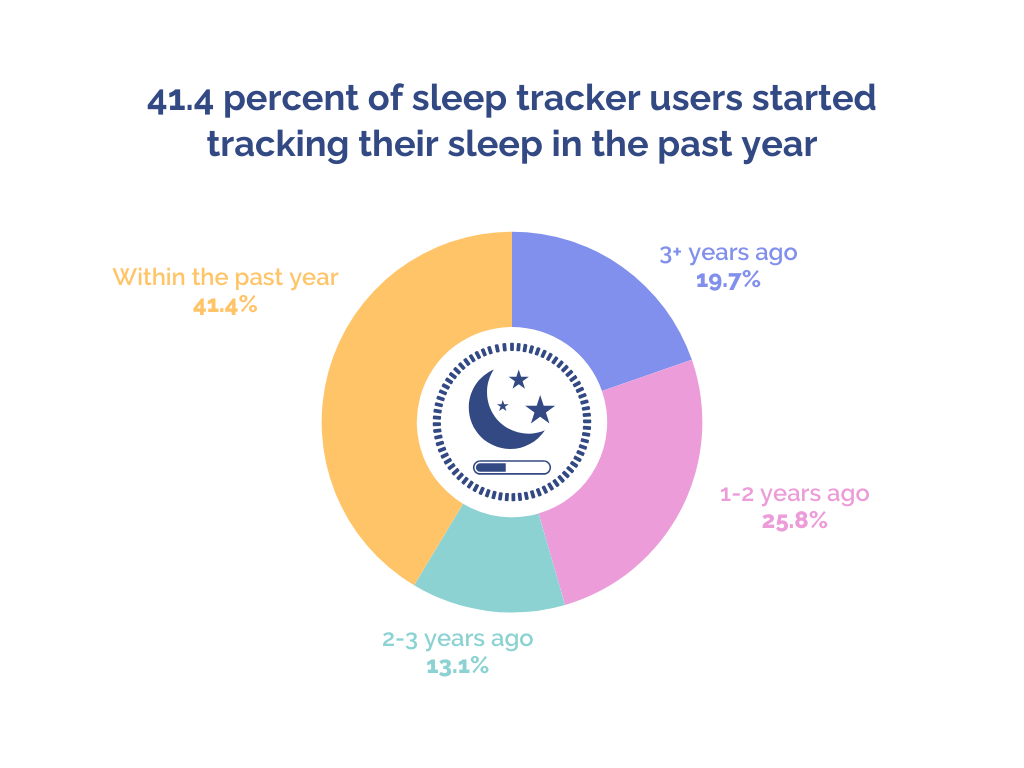
If you’re thinking about purchasing a sleep tracker, Dr. Raj suggests, “The best sleep tracker for you will depend on your individual needs and preferences. If you are not sure which functions are important to you, talk to your doctor or a sleep expert.”
Dr. Harris adds, “[Sleep trackers] can also cause some people to be hyper-focused on their sleep, leading to increased stress or anxiety surrounding their sleep and a reduced sleep quality.”
Over Half of People Plan to Purchase a Sleep Product
Not only are people taking sleep advice and hacks from the internet, but they’re willing to spend their money on a better night’s sleep as well.
64.9 percent of people bought a sleep product in the last 12 months, and 58.2 plan to purchase a sleep product in 2024.
It appears that people are most eager to buy pillows, with 24.3 percent planning on purchasing this sleep item in the next year. Mattresses and sheets were the next most popular purchase plans, with 18.8 percent and 18.6 percent planning on buying these items in the next year, respectively.
Sleep supplements are another anticipated purchase for many, with almost 14 percent saying they plan to buy them in 2024. Dr. Raj and Dr. Harris told us a few important notes to keep in mind when considering sleep supplements;
Dr Harris says, “Melatonin and magnesium are being added to so many things like hot chocolate and body sprays and lotions, yet the data behind them is still quite lacking and inconsistent.”
“Some supplements are not FDA approved, such as melatonin which is considered a dietary supplement, so there can be variations in what’s in each bottle,” explains Dr. Raj, “Bottom line is supplements are not a cure-all for sleep issues and many do not have enough evidence to support their use for better sleep long-term, so always speak to your healthcare provider before starting any new supplement or sleep aid.”
When it comes to money, it appears that people are willing to spend more on sleep in the next year: 16.3 percent said they spent over $500 last year, and 23.6 percent say they are willing to spend over this amount in 2024.
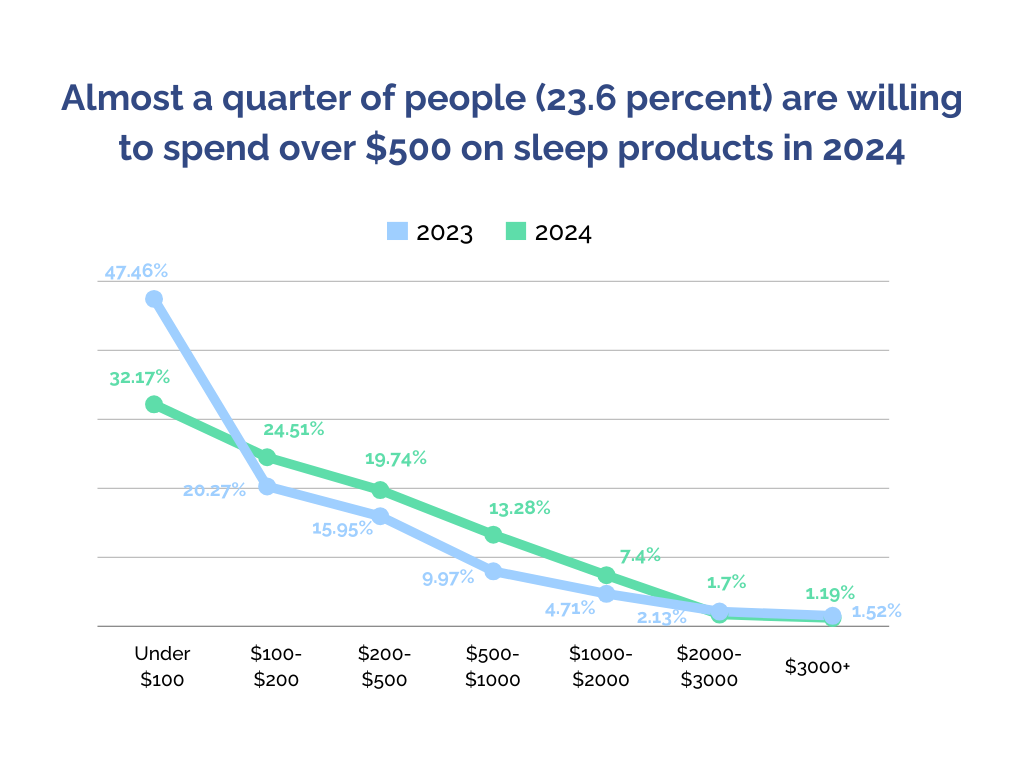
However, over half of people (52.5 percent) say that cost is the biggest obstacle to buying sleep products this year. This comes with no surprise; according to our data, the average price of a 4.5 star rated queen-size mattress is $1,436.01!
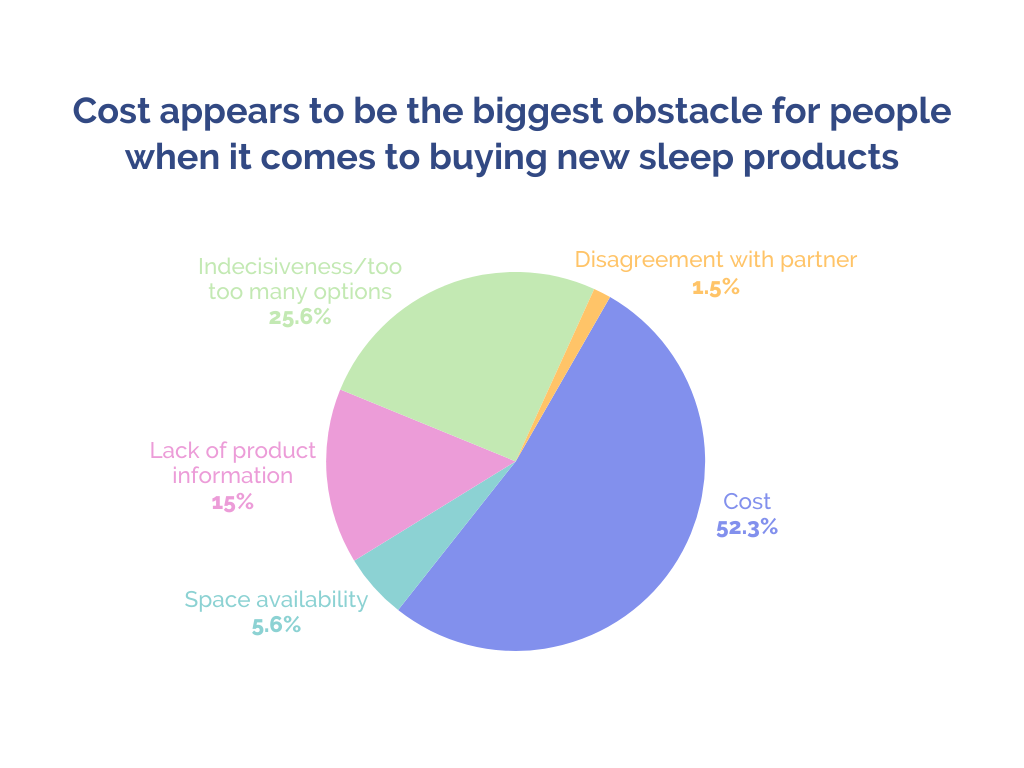
For those looking to improve their sleep on a budget, Dr. Harris says, “Make sure you find and are sleeping on a decent mattress, explore affordable pillow and bedding options, and keep your sleep space clean. Creating a comfortable sleeping environment and sticking to a consistent bedtime routine can do great things to improve your sleep quality without having a hefty price tag.”
Final Thoughts
With an increasing number of people relying on the internet for sleep advice, it’s critical for those seeking knowledge about sleep to do their due diligence and discuss any sleep concerns with a doctor or sleep expert.
For further information on the methodology used for this study, or for more details on this year’s Sleepopolis Report, download the report below. And, for a closer look into our survey findings, download the Sleepopolis 2024 Report.

Sources
- Dasgupta, Raj. Author Interview. March 6, 2024.
- Harris, Shelby. Author Interview. March 6, 2024.




























